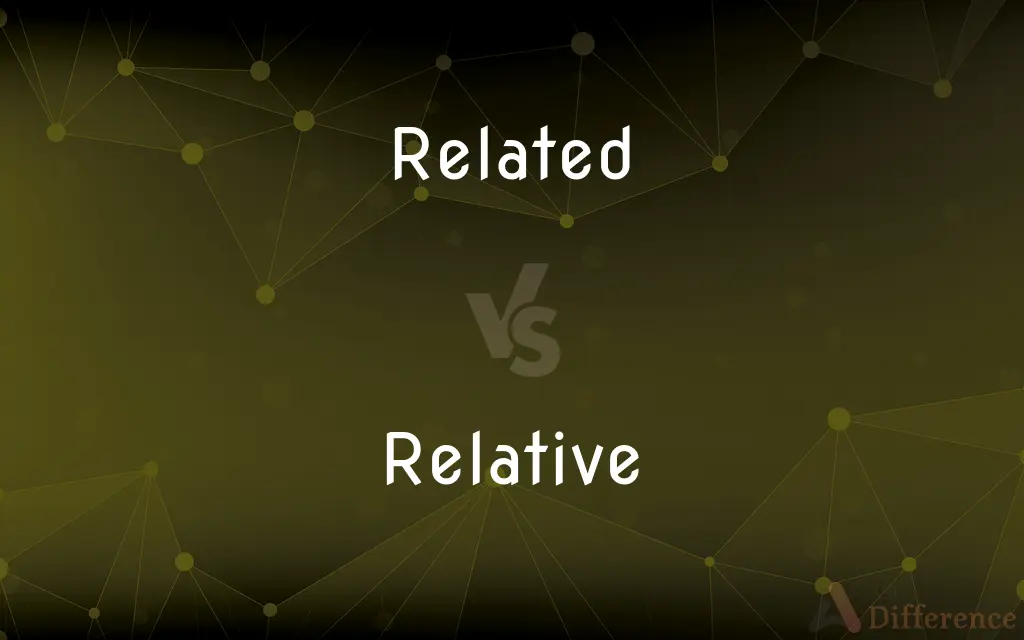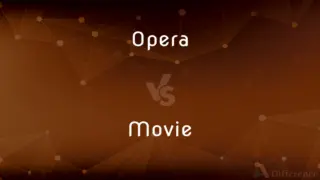Related vs. Relative — What's the Difference?
Edited by Tayyaba Rehman — By Urooj Arif — Updated on April 2, 2024
Related refers to being connected or associated, while relative implies comparison or dependence on something else.

Difference Between Related and Relative
Table of Contents
ADVERTISEMENT
Key Differences
Related denotes a connection or association between things, highlighting how entities share a relationship, whether by blood, theme, or concept. It often describes familial ties or thematic linkages. On the other hand, relative speaks to comparison or a contingent relationship, suggesting that the status, value, or condition of one entity depends on another. This term is frequently used to discuss measurements, values, or statuses that aren't absolute but instead vary according to context or comparison.
While "related" underscores the existence of a link or association, emphasizing connection or relevance among subjects, "relative" introduces a basis for comparison, indicating that an assessment or condition depends on a specific frame of reference. For example, two people may be related by blood, or ideas can be related by theme, whereas the importance or size of something is often relative to another thing, changing with perspective or situation.
The application of "related" generally promotes understanding of connections or associations, enriching the context by revealing networks of relationships. In contrast, "relative" is key to evaluating conditions or measurements within a specific context, allowing for nuanced understanding that acknowledges variability and perspective. This difference is crucial in fields like science, where measurements often require a frame of reference, and in everyday language, where we seek to understand how things are connected or how they compare.
"Related" thereby enhances comprehension of connections, contributing depth to our understanding of relationships, whether personal, conceptual, or thematic. "Relative" challenges us to consider perspective, context, and comparison, emphasizing that many aspects of our world are not fixed but vary according to specific parameters or viewpoints. This nuanced distinction enriches our communication, allowing for precision and clarity in conveying connections and comparisons.
Comparison Chart
Definition
Connection or association between entities.
Contingent upon or compared to something else.
ADVERTISEMENT
Usage
Describes links or associations.
Indicates dependence or comparison.
Context
Familial ties, thematic linkages.
Measurements, values, perspective-dependent.
Implication
Emphasizes connection or relevance.
Suggests variability and perspective.
Application
Enhances understanding of networks of relationships.
Evaluates conditions within specific contexts.
Compare with Definitions
Related
Having a connection or association.
The two studies are closely related in their findings.
Relative
Considered in relation or in proportion to something else.
His speed is impressive relative to his age.
Related
Belonging to the same family.
They are related by blood, being first cousins.
Relative
Pertaining to or signifying the relation of an object or event to something else.
The relative motion of the planets around the sun.
Related
Involved or implicated.
The related parties agreed to a settlement.
Relative
Not absolute or independent of context.
Success is often relative, depending on personal goals.
Related
Linked by characteristics or themes.
These issues are related to one another through common themes.
Relative
Dependent upon a point of reference.
The concept of time is relative in physics.
Related
Pertaining to something in reference.
The documents related to the case were submitted late.
Relative
A family member.
She invited all her close relatives to the family reunion.
Related
Related is an American comedy-drama television series that aired on The WB from October 5, 2005, to March 20, 2006. It revolves around the lives of four close-knit sisters of Italian descent, raised in Brooklyn and living in Manhattan.
Relative
Considered in relation or in proportion to something else
The relative effectiveness of the various mechanisms is not known
Related
Being connected; associated.
Relative
Denoting a pronoun, determiner, or adverb that refers to an expressed or implied antecedent and attaches a subordinate clause to it, e.g. which, who.
Related
Connected by kinship, common origin, or marriage.
Relative
(of major and minor keys) having the same key signature.
Related
(Music) Having a close harmonic connection.
Relative
(of a service rank) corresponding in grade to another in a different service.
Related
Standing in relation or connection.
Electric and magnetic forces are closely related.
On a related note
Relative
A relative pronoun, determiner, or adverb.
Related
Being a relative of.
Everyone is related to their parents.
Relative
A term or concept which is dependent on something else.
Related
Narrated; told.
Relative
Considered in comparison or relation to something else
An animal with a large brain relative to body size.
The relative quiet of the suburbs.
Related
Synonym of relative.
Relative
Having pertinence or relevance; connected or related
How are those remarks relative to the discussion?.
Related
(mathematics) Fulfilling a relation.
Relative
(Grammar) Referring to or qualifying an antecedent, as the pronoun who in the man who was on TV or that in the dictionary that I use.
Related
Having a relationship with the thing named
Gun-related crime.
Relative
(Music) Having the same key signature. Used of major and minor scales and keys
A minor is the relative minor of C major.
Related
Simple past tense and past participle of relate
Relative
A person related to another by heredity, adoption, or marriage.
Related
Standing in relation or connection; as, the electric and magnetic forcec are closely related.
Relative
A species or other taxon that shares a common ancestor, usually a relatively recent ancestor, with another
The jaguar is a relative of the lion.
Related
Narrated; told.
Relative
(Grammar) A relative pronoun.
Related
Same as Relative, 4.
Relative
Connected to or depending on something else; comparative.
Related
Being connected or associated;
Painting and the related arts
School-related activities
Related to micelle formation is the...ability of detergent actives to congregate at oil-water interfaces
Relative
Expressed in relation to another item, rather than in complete form.
Related
Connected by kinship, common origin, or marriage
Relative
(grammar) Depending on an antecedent; comparative.
The words “big” and “small” are relative.
Related
Similar or related in quality or character;
A feeling akin to terror
Kindred souls
The amateur is closely related to the collector
Relative
(music) Having the same key but differing in being major or minor.
Related
Having close kinship and appropriateness;
He asks questions that are germane and central to the issue
Relative
Relevant; pertinent; related.
Relative to your earlier point about taxes, ...
Relative
Capable to be changed by other beings or circumstance; conditional.
Relative
(linguistics) A type of adjective that inflects like a relative clause, rather than a true adjective, in certain Bantu languages.
Relative
Having relation or reference; referring; respecting; standing in connection; pertaining; as, arguments not relative to the subject.
I'll have groundsMore relative than this.
Relative
Arising from relation; resulting from connection with, or reference to, something else; not absolute.
Every thing sustains both an absolute and a relative capacity: an absolute, as it is such a thing, endued with such a nature; and a relative, as it is a part of the universe, and so stands in such a relations to the whole.
Relative
Indicating or expressing relation; refering to an antecedent; as, a relative pronoun.
Relative
Characterizing or pertaining to chords and keys, which, by reason of the identify of some of their tones, admit of a natural transition from one to the other.
Relative
One who, or that which, relates to, or is considered in its relation to, something else; a relative object or term; one of two object or term; one of two objects directly connected by any relation.
Relative
A person related by blood or marriage;
Police are searching for relatives of the deceased
He has distant relations back in New Jersey
Relative
An animal or plant that bears a relationship to another (as related by common descent or by membership in the same genus)
Relative
Not absolute or complete;
A relative stranger
Relative
Properly related in size or degree or other measurable characteristics; usually followed by `to';
Punishment oughtt to be proportional to the crime
Earnings relative to production
Common Curiosities
What does it mean when two things are related?
When two things are related, it means they are connected or associated in some way, either by characteristics, themes, or familial ties.
How do "related" and "relative" differ in scientific contexts?
In scientific contexts, "related" might describe a connection or association between concepts or phenomena, while "relative" often refers to measurements or conditions that depend on a specific frame of reference or comparison.
What is the meaning of relative in a sentence?
In a sentence, relative means something is considered in relation to or in proportion to something else, highlighting comparison or context-dependence.
Is "related" always about family connections?
No, "related" is not always about family connections; it can also refer to thematic, conceptual, or associative links between various entities.
Can people be both related and relative to each other?
Yes, people can be both related (connected by familial ties) and relative to each other in the sense that their roles or importance can be considered in comparison to one another.
Why is it important to recognize something as relative?
Recognizing something as relative helps acknowledge its variability and dependence on context or comparison, which is crucial for accurate assessment and understanding.
Can "related" imply causality?
While "related" can suggest a connection, it does not inherently imply causality; further context is needed to establish a cause-and-effect relationship.
Can something be relative without being compared?
The concept of being relative inherently involves comparison or context; without these, the term would not apply.
How do cultural differences affect the perception of what is related or relative?
Cultural differences can shape what entities are considered related and what comparisons are deemed relevant, reflecting diverse values and contexts.
How does understanding the difference between related and relative benefit communication?
Understanding the difference enhances clarity and precision, enabling more accurate expression of connections and comparisons.
Is the relative importance of an issue fixed?
The relative importance of an issue can vary depending on perspective, context, and comparison to other issues.
Can the use of "related" or "relative" be subjective?
Yes, the application of these terms can be subjective, influenced by the speaker's perspective and the context in which they are used.
In technology, how are "related" and "relative" used differently?
In technology, "related" might refer to connected systems or concepts, while "relative" could pertain to performance metrics compared to a standard.
How do "related" and "relative" impact our perception of relationships and measurements?
These terms shape our understanding by highlighting connections and the importance of context, enhancing our grasp of complex relationships and variable measurements.
Can the meaning of "related" and "relative" evolve over time?
Yes, the usage and nuances of "related" and "relative" can evolve, reflecting changes in language, culture, and scientific understanding.
Share Your Discovery

Previous Comparison
Pit vs. Pitted
Next Comparison
Opera vs. MovieAuthor Spotlight
Written by
Urooj ArifUrooj is a skilled content writer at Ask Difference, known for her exceptional ability to simplify complex topics into engaging and informative content. With a passion for research and a flair for clear, concise writing, she consistently delivers articles that resonate with our diverse audience.
Edited by
Tayyaba RehmanTayyaba Rehman is a distinguished writer, currently serving as a primary contributor to askdifference.com. As a researcher in semantics and etymology, Tayyaba's passion for the complexity of languages and their distinctions has found a perfect home on the platform. Tayyaba delves into the intricacies of language, distinguishing between commonly confused words and phrases, thereby providing clarity for readers worldwide.
















































